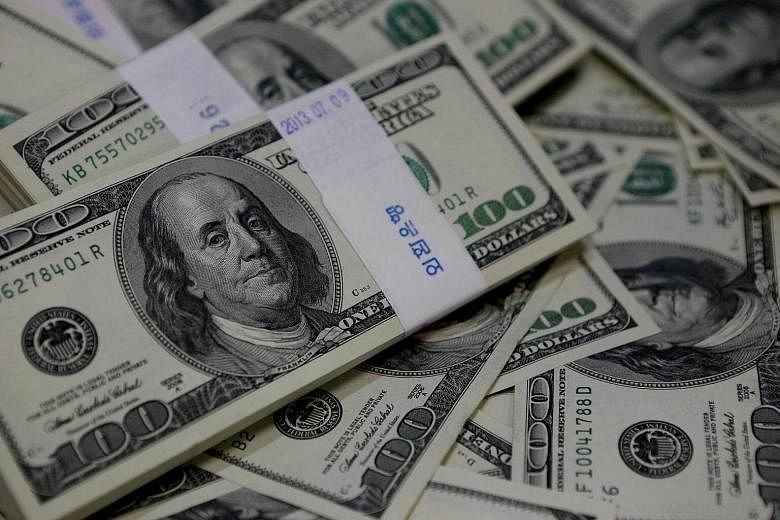SINGAPORE (REUTERS) - The dollar crept up from a 13-month low on Tuesday (July 25) after stronger-than-expected readings on US factory and services activity ahead of the start of a Federal Reserve meeting later in the day, but Asian stocks were subdued.
The dollar and US Treasury yields rose on expectations the Fed will say it will begin reducing its bond portfolio at its September meeting.
The dollar index, which tracks the greenback against a basket of trade-weighted peers, rose 0.1 per cent to 94.078 on Tuesday, after earlier revisiting its lowest level since June 2016, first hit on Monday.
The dollar rose 0.15 per cent to 111.29 yen early on Tuesday, after touching a six-week low on Monday.
The 10-year US Treasury yield rose to 2.257 per cent early on Tuesday, up from last week's close of 2.232 per cent.
On Monday, Markit's manufacturing and services flash surveys both showed the US economy beating expectations, while euro zone business growth at the start of the second half of the year slowed.
The euro, which posted losses on Monday after earlier hitting a near-two-year high, extended losses a touch on Tuesday to trade at US$1.16385.
"(US) Markit Purchasing Managers Index data beat expectations to show growth potential whilst European PMI's fell slightly below expectations to help soften the euro," said Mr Matt Simpson, senior market analyst at ThinkMarkets in Melbourne.
"Yet, as Europe's business surveys continue to outperform those of the US, last night was a minor victory at best for the greenback," he added. "The expectation of a slightly dovish Fed and a White House seemingly in turmoil is likely to weigh further on the greenback for the foreseeable future."
Mr Jared Kushner, US President Donald Trump's son-in-law and senior adviser, told Senate investigators on Monday he had met Russian officials four times last year but said he did not collude with Moscow to influence the 2016 US election.
The ongoing probes into the Russia matter by congressional panels and a Justice Department special counsel, as well as weak US economic data and reduced inflation expectations, have weighed on the dollar for much of the month.
MSCI's broadest index of Asia-Pacific shares outside Japan was flat in early trade, with a number of markets looking for fresh impetus after hitting multi-year highs in recent weeks.
Japan's Nikkei rose 0.3 per cent and Australian stocks jumped 0.35 per cent, making up some of Monday's 0.6 per cent slide. South Korea's KOSPI was little changed.
Overnight on Wall Street, the Nasdaq set a new all-time high as investors bet on solid earnings from technology companies. The S&P 500 and the Dow closed in negative territory, following European stocks, which lost 0.2 per cent.
In commodities, oil prices continued their recovery on a pledge by leading Opec producer Saudi Arabia to cut exports in August to help reduce the global crude glut. Haliburton's executive chairman also said the US shale drilling boom would probably ease next year.
US crude rose 0.1 per cent to US$46.40 a barrel, after closing up 1.25 per cent on Monday.
Global benchmark Brent added 0.2 per cent to US$48.71, extending Monday's 1.1 per cent rise.
The dollar's recovery weighed on gold, with the precious metal losing 0.1 per cent to US$1,253 an ounce.

